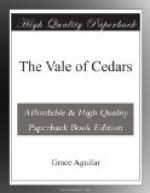Order was at length universally restored, and after a brief silence, the chief of the Santa Hermandad demanded of the prisoner if he had aught to say in his defence, or reply himself to Don Luis Garcia’s charge. The reply was a stern, determined negative; and, deputed so to do by the Sub-Prior, who seemed so absorbed in the horror of Marie’s daring avowal, as to be incapable of further interference, the Hermano proceeded to sum up the evidence. As the widow of the deceased had so strangely, yet effectually deprived them of her evidence, he said, he thought some slight regard ought to be paid to Don Luis Garcia’s words; but even without doing so, the circumstantial evidence, though contradictory and complicated, was enough in his opinion to convict the prisoner; but he referred to his associates and to the peers then present, to pronounce sentence. His task was but to sum up the evidence, which he trusted he had done distinctly; his opinion was that of but one individual; there were at least fifty or sixty voices, to confirm or to oppose it.
Deep and sustained as had been the interest throughout the trial, it was never more intense than during the awful pause which heralded the prisoner’s doom. It was spoken at length; the majority alike of the nobles and of the Santa Hermandad, believed and pronounced him guilty, and sentence of death was accordingly passed; but the Duke of Murcia then stepped forward, and urged the following, not only in the name of his brother peers, but in the name of his native sovereign, Isabella; that in consideration of the complicated and contradictory evidence, of the prisoner’s previous high character, and of his strongly protested innocence, a respite of one month should be granted between sentence and execution, to permit prayers to be offered up throughout Spain for the discovery of the real murderer, or at least allow time for some proof of innocence to appear; during which time the prisoner should be removed from the hateful dungeon he had till that morning occupied, and confined under strict ward, in one of the turrets of the castle; and that, if at the end of the granted month affairs remained as they were then, that no proof of innocence appeared, a scaffold was to be erected in the Calle Soledad, on the exact spot where the murder was committed; there the prisoner, publicly degraded from the honors and privileges of chivalry, his sword broken before him, his spurs ignominiously struck from his heels, would then receive the award of the law, death from hanging, the usual fate of the vilest and commonest malefactors.
Ferdinand and the Sub-Prior regarded him attentively while this sentence was pronounced, but not a muscle in his countenance moved; what it expressed it would have been difficult to define; but it seemed as if his thoughts were on other than himself. The King courteously thanked the assemblage for their aid in a matter so momentous, and at once ratified their suggestion. The Associated Brethren were satisfied that it was Isabella’s will; confident also in their own power to prevent the evasion, and bring about the execution of the sentence, if still required, at the termination of the given time; and with a brief but impressive address from the Sub-Prior to the prisoner, the assemblage dispersed.




